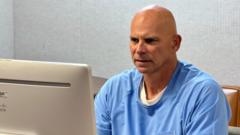Erik Menendez's hopes for early release from prison have been dashed, as California parole authorities deny his parole request stemming from the 1989 murders of his parents, amid ongoing appeals for clemency and further trials.
### Erik Menendez Denied Parole: A Setback Three Decades After Parents' Murders

### Erik Menendez Denied Parole: A Setback Three Decades After Parents' Murders
**California Board Rules Against Freedom Request Amid Ongoing Legal Battles**
In a decision that marks a significant moment in a case that has captivated the public for over thirty years, Erik Menendez, one of the infamous Menendez brothers, was denied parole during a hearing held via video link from his San Diego prison. The board's ruling comes as part of a broader review of both brothers' legal circumstances following a resentencing that deemed them eligible for parole. Erik's intervention was his first since being granted eligibility for a new hearing in May.
During the extensive hearing, which lasted more than 10 hours, a parole board commissioner expressed concerns arising from Erik's behavior both inside prison and prior to the heinous crime. Commissioner Robert Barton emphasized that Erik posed an "unreasonable risk to public safety," citing his violations during incarceration as a troubling aspect of his case. "You have not been a model prisoner… this is a little disturbing," Barton stated sternly.
While Erik can apply for parole again in three years, the denial shifts focus toward California Governor Gavin Newsom, who is currently reviewing a clemency request from both brothers. Any clemency awarded could lessen their sentences or grant a pardon but would not affect their underlying convictions. This decision poses a political risk for Newsom, who is speculated to be a potential candidate for the Democratic presidential nomination.
Both brothers have also sought a new trial due to newly discovered evidence, a request that is presently under judicial review against opposition from the Los Angeles district attorney’s office. Prosecutors argued in the recent hearing that Erik's behavioral changes were insincere and solely aimed at enhancing his chances for release, labeling him as a persistent threat to society.
Throughout the hearing, Erik reflected emotionally on the tragic events of August 20, 1989, when he and his brother shot their parents, Jose and Kitty Menendez. Expressing deep remorse, he sought to convey his desire for familial healing rather than personal redemption, stating: "If I ever get the chance at freedom, I want the healing to be about them."
While Erik's brother, Lyle Menendez, is slated for his own parole hearing soon, the stark contrast in their prison behavior and past criminal records may yield differing outcomes. During the parole session, the board scrutinized Erik’s history, including prior burglaries and multiple infractions in prison—such as possessing contraband and engaging in fights—leading to the conclusion that his potential release would be ill-advised.
In conclusion, the board made it clear that Erik's behavior before and during imprisonment played a significant role in their decision. With continued public and familial advocacy for the Menendez brothers, the complex layers of their case continue to capture attention, raising questions about justice, punishment, and the possibility of redemption. As the brothers navigate a convoluted legal landscape, the quest for freedom remains fraught with challenges and implications.
During the extensive hearing, which lasted more than 10 hours, a parole board commissioner expressed concerns arising from Erik's behavior both inside prison and prior to the heinous crime. Commissioner Robert Barton emphasized that Erik posed an "unreasonable risk to public safety," citing his violations during incarceration as a troubling aspect of his case. "You have not been a model prisoner… this is a little disturbing," Barton stated sternly.
While Erik can apply for parole again in three years, the denial shifts focus toward California Governor Gavin Newsom, who is currently reviewing a clemency request from both brothers. Any clemency awarded could lessen their sentences or grant a pardon but would not affect their underlying convictions. This decision poses a political risk for Newsom, who is speculated to be a potential candidate for the Democratic presidential nomination.
Both brothers have also sought a new trial due to newly discovered evidence, a request that is presently under judicial review against opposition from the Los Angeles district attorney’s office. Prosecutors argued in the recent hearing that Erik's behavioral changes were insincere and solely aimed at enhancing his chances for release, labeling him as a persistent threat to society.
Throughout the hearing, Erik reflected emotionally on the tragic events of August 20, 1989, when he and his brother shot their parents, Jose and Kitty Menendez. Expressing deep remorse, he sought to convey his desire for familial healing rather than personal redemption, stating: "If I ever get the chance at freedom, I want the healing to be about them."
While Erik's brother, Lyle Menendez, is slated for his own parole hearing soon, the stark contrast in their prison behavior and past criminal records may yield differing outcomes. During the parole session, the board scrutinized Erik’s history, including prior burglaries and multiple infractions in prison—such as possessing contraband and engaging in fights—leading to the conclusion that his potential release would be ill-advised.
In conclusion, the board made it clear that Erik's behavior before and during imprisonment played a significant role in their decision. With continued public and familial advocacy for the Menendez brothers, the complex layers of their case continue to capture attention, raising questions about justice, punishment, and the possibility of redemption. As the brothers navigate a convoluted legal landscape, the quest for freedom remains fraught with challenges and implications.



















